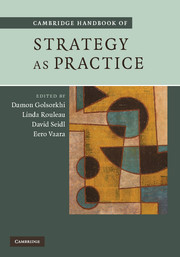Book contents
- Frontmatter
- Contents
- List of figures
- List of tables
- List of contributors
- Introduction: What is Strategy as Practice?
- PART I ONTOLOGICAL AND EPISTEMOLOGICAL QUESTIONS
- PART II THEORETICAL DIRECTIONS
- PART III METHODOLOGICAL TRACKS
- 13 Broader methods to support new insights into strategizing
- 14 Critical discourse analysis as methodology in Strategy as Practice research
- 15 Researching everyday practice: the ethnomethodological contribution
- 16 Researching strategists and their identity in practice: building ‘close-with’ relationships
- 17 Studying strategizing through narratives of practice
- PART IV APPLICATION VARIATIONS
- Author Index
- Index
17 - Studying strategizing through narratives of practice
Published online by Cambridge University Press: 05 October 2012
- Frontmatter
- Contents
- List of figures
- List of tables
- List of contributors
- Introduction: What is Strategy as Practice?
- PART I ONTOLOGICAL AND EPISTEMOLOGICAL QUESTIONS
- PART II THEORETICAL DIRECTIONS
- PART III METHODOLOGICAL TRACKS
- 13 Broader methods to support new insights into strategizing
- 14 Critical discourse analysis as methodology in Strategy as Practice research
- 15 Researching everyday practice: the ethnomethodological contribution
- 16 Researching strategists and their identity in practice: building ‘close-with’ relationships
- 17 Studying strategizing through narratives of practice
- PART IV APPLICATION VARIATIONS
- Author Index
- Index
Summary
Until now, most papers associated with the Strategy as Practice perspective have been based mainly on longitudinal case studies drawing on ethnographic methods. While these methods provide a complex set of historical and contextual data that are obviously necessary for understanding practices, they tend to concentrate on the organizational level, thus leaving unclear the way managers and others draw on their explicit and tacit knowledge when they are strategizing. Only a few works from a practice perspective have utilized specific methodological tools that are truly appropriate for querying the essence of managerial agency in strategizing (Samra-Fredericks 2003; Balogun and Johnson 2004, 2005). The development and institutionalization of the Strategy as Practice perspective needs to draw on methodological tools that are more focused on action in order to understand how managers and others actually ‘do’ the strategy.
Biographical methods constitute a set of pertinent qualitative methods of inquiry for carrying out in-depth studies of strategic practices. Aiming to gather information on the subjective essence of a person's life or part of that life, biographical research focuses on individuals who are asked to reflect on their experiences in order to document change processes that might or might not be related to life transitions (Goodley et al. 2004). To better understand how managers and others act and interact, what knowledge they rely on and what skills they use when they are strategizing, biographical methods constitute a relevant methodological option offering multiple variants (biography, life story, autobiography, life history, and so on).
- Type
- Chapter
- Information
- Cambridge Handbook of Strategy as Practice , pp. 258 - 270Publisher: Cambridge University PressPrint publication year: 2010
- 15
- Cited by



